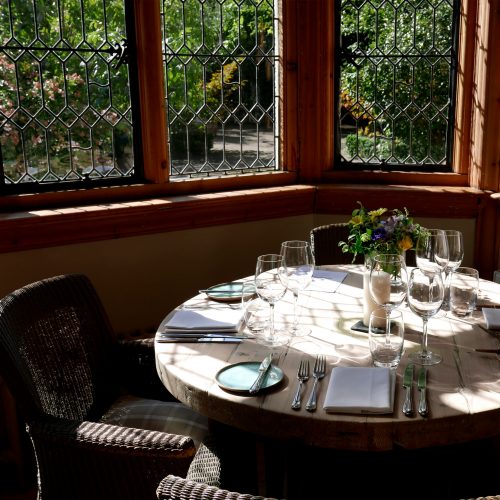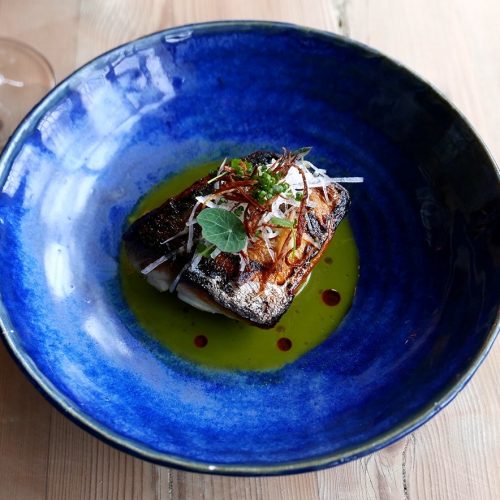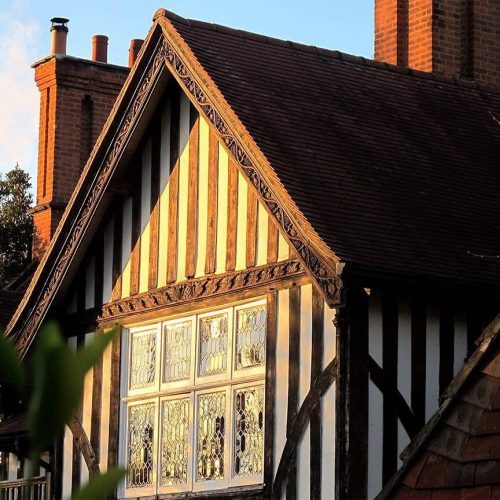2010
Kenneth Culhane
“The Roux Scholarship stage has to be the most unique experiences any chef will have in their lifetime.”
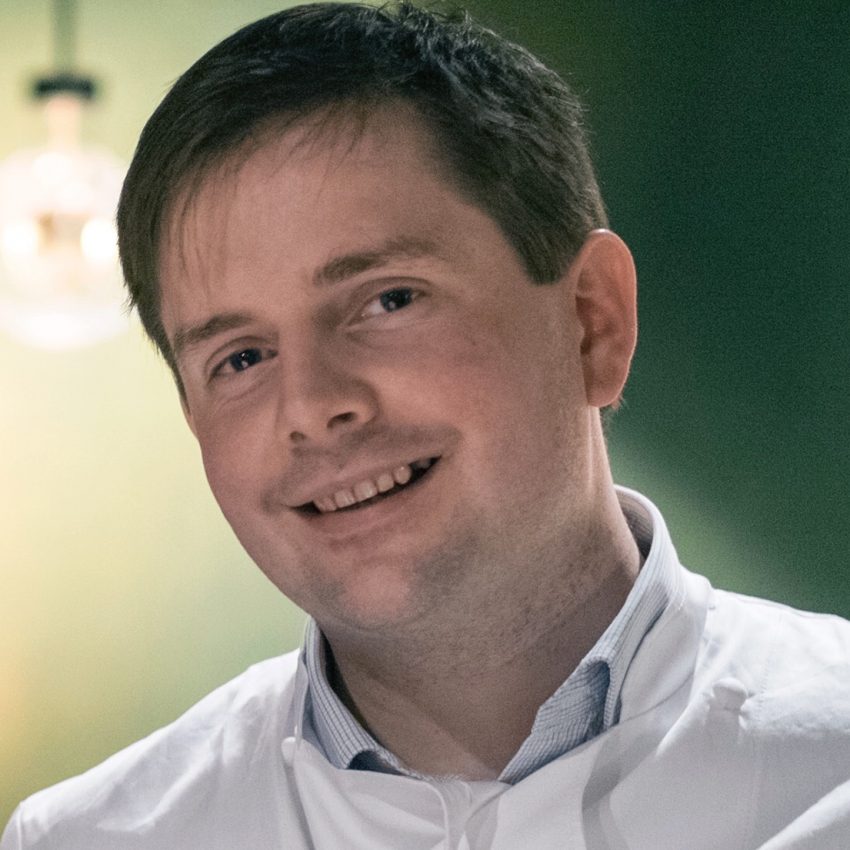
In 2010, Kenneth won the competition at the age of 28 and did his stage at Jean Georges in New York.
Kenneth was born in Kerry in the West of Ireland where he grew up on his family’s farm, eating his grandmother’s freshly baked bread and gathering wild mushrooms and berries in the surrounding countryside, which forged an early love of food. It wasn't until much later that he would discover fine dining, eating his first Michelin-starred meal at the age of 22.
After studying science at college, Kenneth decided his heart lay with the culinary arts and went on to study a Dublin BA (Hons) in Culinary Arts at the Dublin Institute of Technology, where he was inspired by his lecturer James Carberry – Roux Scholar 1992. The course helped him understand the complexities of the industry and inspired his decision to cook in Michelin-starred establishments.
Kenneth took the first step towards this goal when he went to work at the two Michelin-starred restaurant Patrick Guilbaud in Dublin, under for Chef Guillaume Le Brun who had trained at the three-star Michelin Le Pré Catelan in Paris. It was the first time Kenneth was working in a team surrounded by a team of chefs who had also trained with the most lauded chefs in France. Here, he learned about using premium seasonal ingredients, and about food artistry, perfectionism, precision, discipline, restraint, finesse and all the foundations of the classics of cookery. This experience inspired Kenneth to learn all he could about what it takes to be a chef.
Chef Le Brun, who comes from the Loire region in France, then organised for Kenneth to work with Michelin-starred chef Pascal Bouvier at Le Choiseul in Amboise. Kenneth describes the experience of working in the Loire Valley as 'a period of enlightenment' where he was cooking with vibrant, flavoursome and inspirational seasonal produce sourced from local markets where, twice weekly, all the farmers would make sure that they always presented the finest produce at the given time in each season. This environment instilled in him an even greater respect for nature and working with it.
During his degree in Culinary Arts, Kenneth was student of the year and was granted The David Gumbleton Scholarship, which enabled him to go and work with Chef Tetsuya Wakuda in Sydney. Tetsuya showed Kenneth the Japanese way of analysing produce and art, but as he also used many French classical cooking techniques, Kenneth found the chef's skill in combining both cultures with balance and finesse fascinating. That year, 2005, Tetsuya's Restaurant was named fourth best in the San Pellegrino World's 50 Best Restaurants.
The year Kenneth won the Roux Scholarship, he was working for Baxter Storey as sous chef at the headquarters of Barclays Bank in Canary Wharf, which gave him a great education in the corporate world of business and management, working within a busy operation (in a building of 8,500 people) providing a bespoke catering service to managing directors in nine dining rooms and a fine dining restaurant with up to 50 covers, bringing the total to 140 covers. The hospitality provision averaged around 200 covers daily with events of up to 200 incorporating working lunches, fork buffets and canapé parties for up to 500 guests.
Fuelled with confidence after winning the Roux Scholarship, Kenneth joined the family-owned and run The Dysart, in Petersham as head chef in July 2012 where he uses his commitment to quality ingredients, to responsible sourcing and concern for tradition. Although Petersham is only 30 minutes from Mayfair, the restaurant is set in a countryside environment, which provides much inspiration, and allows for accessing interesting food producers whose accumulated knowledge and dedication to traditional methods allow them to supply produce with the fullest flavour.
In October 2019, The Dysart was awarded one Michelin star in the 2020 guide.
Kenneth is a member of the Slow Food UK Chef Alliance.
Watch Alain Roux and Michel Roux Jr cook the dish Kenneth cooked in the 2010 national final here
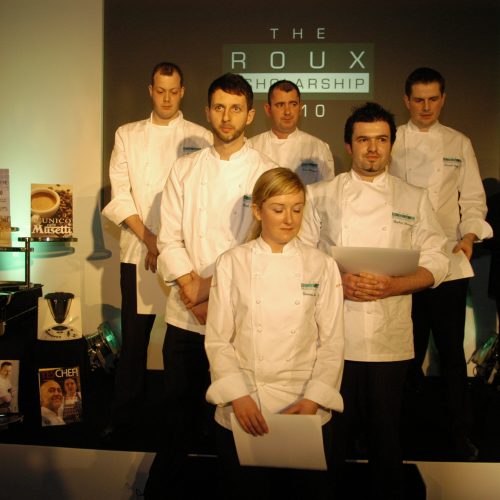
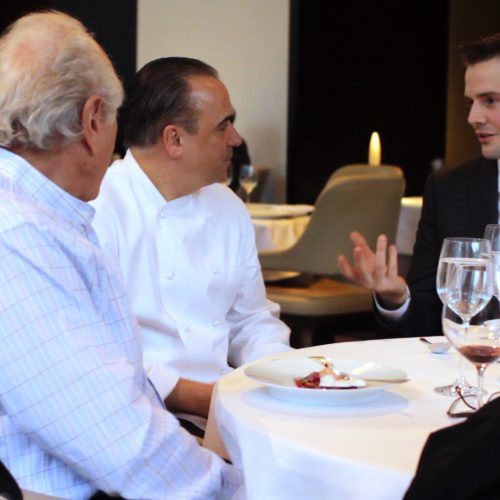
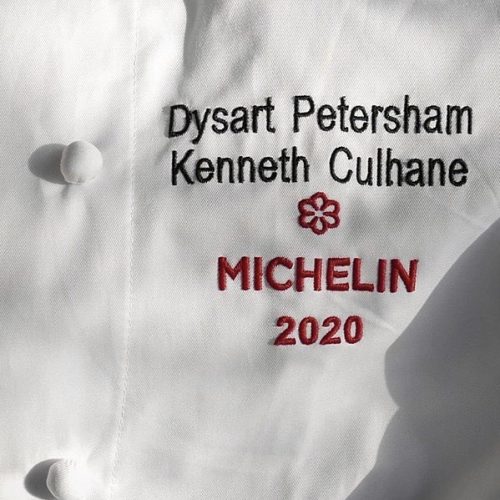
What are your early memories of food?
My childhood, on a remote farm in Southern Ireland, was pivotal towards instilling in me an understanding of good husbandry and of the top quality produce that only comes from a true understanding of the particular qualities of the land, the soil and nature, now a natural harmony for me. There are no greater memories of rural Ireland than the morning call on the farm of the soda breads’ heart-warming aromas baking in the peat oven, a ritual that shaped my childhood. Personally, I remember the acts of warm hospitality and the spirits and characters of the people – and the role of food in that - the importance of food and the table as a medium of celebration in tandem with the workings of the farm. Food was about community, about the earth and taking care of it. This was especially so in times of harvest such as making hay, silage or gathering of peat from the bog on our farm, depending on what the land required that year. I remember it was always long days with a hard working mindset and culture.
Did you have any other influences growing up?
The other great passion surrounding me when growing up was Gaelic football. Kerry is the most successful team in Gaelic football sporting history, and one of our cousins was part of the legendary Kerry Gaelic football teams in the 80s, regarded as the greatest team of all time in Ireland. He captained them during this period and I remember well the excitement of these passions and successes growing up in our family home as a young boy; it fuelled a passion for excellence and appetite to win, within team dynamics.
Where did you do your stage?
The Roux Scholarship stage has to be the most unique experiences any chef will have in their lifetime: I chose Jean Georges in New York City. I just felt that I’d worked in a number of locations in the UK, Ireland and around Europe and now I wanted to experience a new, exciting, buzzing city in the world of food and, for me, New York stood out the most; it's such an exciting city to work and live in. I very much enjoy the cultural workings of Asian cuisines and this passion grew during my time with Tetsuya with his Japanese and French-inspired cookery. Cooking food is a beautiful alchemy and transformation; the consequence of this is where we integrate various influences to create certain meanings that have a uniqueness to us all. Jean George’s is a chef that follows the same mantra, except he’s influenced by many more Asian cultures expressed through the classical foundations of French gastronomy as he worked with three-star chefs Paul Bocuse, Paul Haeberlin and Louis Outhier. This is why I felt he was the right chef to work with. Because of the scholarship the team at Jean George’s where incredibly accommodating in sharing their knowledge.
Tell us about the experience?
The team is split into am teams and pm teams as they do up to 140 covers a service at three-star level. I worked as much as I could on both shifts to be able to get the most from the experience and also to help gain the respect of the both teams as it’s such a big brigade. I got to work on all sections and also spent time, near the end of my stage, working and helping on the pass, which was invaluable experience. I asked Jean George’s would it be possible on my days off when the restaurant closed to work in his many other restaurants, which he happily did, so I got to see how a chef-restauranteur operated at such a high level in so many various food cultures and business adaptations. I also got to do some stages in other restaurants on my days off such as the two-star Michelin restaurant Marea for a number of weeks and a number of other restaurants from chefs that I met at Jean George’s, along with eating in some great restaurants; it was such a positive training all made possible by the scholarship. You have to make the most of these opportunities you get in life and while I was in New York let’s just say I didn’t get much sleep!
What did you cook in the final?
Beef en croûte à la Bisontine. The final was such a wonderful experience now, looking back on it. At the time I was nervous but kept positive and was quietly determined. I wished to win this fantastic competition, it was certainly a very challenging day, but was incredible to be given the opportunities to meet and be surrounded by so many great people. I had to cook Beef en croûte à la Bisontine, braised baby gem, pomme duchesse with a cauliflower purée and a sauce béarnaise, which we had two hours to complete and serve on a platter. This required one to make a puff pastry which was the first job I set myself to complete, preparing the beef fillet and wrapping it in a mushroom duxelle, spinach and then a pancake, setting in the fridge and then covering in the puff pastry and glazing three times with an egg wash. We had to braise baby gem using veal stock and a brunoise of vegetables. I made duchesse potatoes using cylinders to keep the shape and, once cooked, were removed to enable the cauliflower purée to be filled into the potato and then a classic béarnaise in a saucière.
What advice would you give applicants?
Take your time: it’s not a sprint, educate yourself in the workings of the scholarship. Learn classical methods – the essential bedrock of all. Work smart, be humble, all the while keeping constantly open to new possibilities and enjoy as much as you can a wonderful experience in your professional career and life
Tell us about your current role and your career highlights?
Since wining the scholarship, I’ve been head chef at The Dysart Petersham, building the business yearly and ringing the changes as we develop and grow. The award of a Michelin star last year for the business is a new chapter in the story. It was a wonderful celebration at the The Hurlingham Club, amazing to see the Roux family and so many Roux scholars on the night. For the future, we are looking at further evolving the business, nourishing its individuality as a wonderful destination to dine, continuing to push the business forward towards earning more accolades, developing its international recognition, all underpinned by family values.
What is it like to be a Roux Scholar?
It’s certainly not a cliché to say that wining the scholarship will change your life. The world of a modern chef is a very complex business this gives a chef a great opportunity to express their passions and explore new landscapes with so many wonderful people. It certainly teaches you that responsibility and opportunity are synonymous. Part of been a creative chef, one's duties are to make people see beauty in something that people have not seen beautiful until now, in a sense art needs creativity and creativity is about sharing to make it true, something that's so evident through the fabric of the generosity of the scholarship. We’ve shared so many moments in various countries such as New York, Germany, Japan, it’s about always asking questions and keeping that child-like curiosity to life, it’s a great honour to be a Roux scholar.
Who are your culinary heroes?
It absolutely started with my Mom and Nan's love of food and great sense of the warm hospitality and the tables importance on the farm in rural Ireland. Professionally, I’ve been very fortunate, having worked with amazing teams and people over the years. Wining the Roux Scholarship in 2010 had a profound impact on my cooking and inspirations in life. The Roux family since have been a constant support and wonderful network to the best moments in hospitality for me, it’s a legacy that helps one embark and focus on life-long learning. Our signature dish of Cornish mackerel, radish, champagne and ginger at the Dysart Petersham is inspired by the Roux family’s generosity. The family organise biennial educational trips around the world for the scholars. In 2012 we visited Japan, a life changing experience with so many wonderful memories in traditions and culture. On my return I wished to eulogise these experiences in a dish, along with respecting the philosophical principles of Kanso which was a standout discovery during our stay. It represents the ingenuity of Japanese culture, and how nature can be characterised and respected through a natural manner using humble ingredients to make something celebratory and special, with skill, harmony, balance and restraint. This dish has become one of the most popular dishes among critics and our customers at The Dysart Petersham. Also, over the past number of years my wife and Mauritian family have culturally introduced me to so many different ways to look at food, visiting the island is always an education, such wonderfully warm passionate people. A commonality of experiences where food, respect and hospitality go hand in hand. The Taylor family since I’ve started at the Dysart Petersham introduced me to the world of classical music, of which they have an extended knowledge, seeing music as another and utterly natural dimension of hospitality. We thus have classical recitals once a month, an intimate and personal atmosphere with musicians who are already performing as soloists and in chamber groups at international venues such as the Wigmore and Carnegie Halls. Music is a wonderful example of something that’s in this world but not of this world, comparable to fine gastronomic experiences. Classical works of music speak to us from another province, even though they speak to us in ordinary physical sounds. It’s a pleasure working with the same appreciation for wine and food, widening our palates through the cultures over the millennia. The family have a great eye for, both an overall vision, and for details, perfectionism and upholding the beauty of all the arts, constantly making me reflect on my creative processes, along with mentoring on the day-to-day running of the business, invaluable help in a world which at times can feel Sisyphean in nature, tremendous support in finding ones inner voice.
What do you remember most about the competition the year you won?
The most striking aspect of the competition was meeting so many amazing people of the hospitality world and for them to be so nice and full of encouragement towards all involved, with huge respect towards what the Roux family stands for. The competition has a great positive energy that is all that is great about the workings of hospitality. It’s a great celebration of love, passions and awareness.
How many times did you enter?
I entered the competition three times, twice I got into the regional finals and then the year I won was my first time in the national final. I really think that each year you enter can help find your way; I made a lot of mistakes the first years and got myself much more focused on what I needed to work on the year I won.
What inspired you to join the Slow Food alliance?
At the end of the day we are what we eat, and the land for future generations will be what we make of it, and what we can recover from too many years of intensive and mono-cultural abuse of it – albeit with the best of intentions – in our husbandry. We should all be knowledgeable about the responsible food cycle – from farm to plate. Important questions that we always ask of our produce: is it sustainably caught; line caught? Is it humanely raised; grass-fed; free range? Is it driven by the seasons, biodynamic, intensively, traditionally, naturally, organically or GM farmed? Is it from a small-scale, independent producer? Knowing this is only part, and the beginning, of the big picture. A better way to eat is the sum of a number of vital parts, a big picture – greater enjoyment of the flavours, colours and scents of nature, greater understanding of their benefits to us beyond these sensations, greater responsibility towards the welfare and survival of a rich diversity of animals, and plants, and of nature itself. Greater understanding that this starts with the land itself, greater perception of the need to preserve these for the future are vital. Good diet and responsible living are about quality, balance and restraint. Dietary imbalance is at the root of many modern health problems.
